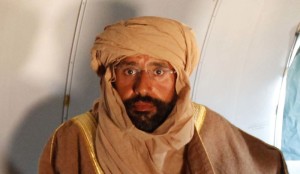by Miša Zgonec-Rožej*
 On 21 May, the Appeals Chamber of the International Criminal Court (ICC) in The Hague rejected Libya’s bid to prosecute Saif Gaddafi domestically and confirmed that he should be tried by the ICC. The ICC’s decision is the correct one and hopefully Libya will comply with it.
On 21 May, the Appeals Chamber of the International Criminal Court (ICC) in The Hague rejected Libya’s bid to prosecute Saif Gaddafi domestically and confirmed that he should be tried by the ICC. The ICC’s decision is the correct one and hopefully Libya will comply with it.
According to the Rome Statute, the ICC cannot try a case where the same case is being investigated or prosecuted by a state which has jurisdiction over it, unless the state is unable or unwilling genuinely to carry out the investigation or prosecution. The Appeals Chamber confirmed that Libya had not provided enough evidence to demonstrate that it was investigating the same case as the one before the ICC.
The decision comes as no surprise. The situation in Libya has been in a state of near-anarchy, characterized by lawlessness, insecurity, and an ineffective police and judicial system. UN and human rights organizations report widespread abuses, and the government has been unable to control the militias who continue to exert their influence and pressure on Libyan authorities, including the judiciary.
Since his capture in November 2011, Gaddafi has been detained by militias in Zintan, a town 170 km southwest of Tripoli, without any access to a lawyer, family or relatives, without access to the evidence against him and without the facilities for the preparation of his defence. In December 2013, the UN Working Group on Arbitrary Detention found that Gaddafi’s detention had been arbitrary and that the nature and the gravity of violations, together with the government’s inability to rectify the violations, had made it impossible to guarantee Gaddafi’s right to fair trial in Libya.
Notwithstanding the Pre-Trial Chamber’s decision, and the Appeals Chamber’s ruling that Libya’s appeal had no suspensive effect, the domestic trial in Libya against Gaddafi opened on 14 April in Tripoli. The Zintan authorities continue to refuse, however, to deliver Gaddafi to Tripoli, for reasons of his safety. Despite the fact that some of the charges in the domestic proceedings against Gaddafi carry the death penalty, the Tripoli court decided that he could be tried via video-link. One UN observer at his trial has been detained on the spurious basis of using ‘black magic’ at the hearings. The trial, which plainly fails to meet elementary due process guarantees, is scheduled to resume on 25 May.
Impunity in Libya
However, some of the ICC’s actions with regard to Libya have also been questionable. The UN Commission of Inquiry found that international crimes were committed not only by Gaddafi forces but also by the pro-revolutionary forces (thuwar). Although the UN Security Council does not limit the ICC’s mandate to investigate crimes committed by the Gaddafi forces, the ICC has shown little interest in dealing with rebels’ crimes. Instead, in a memorandum of understanding (MOU) concerning burden sharing and information exchanges with Libya signed in 2013, the ICC prosecutor agreed to prioritize its investigation and prosecution of pro-Gaddafi officials outside Libya, who continue to use their influence to destabilize the country and pose a security threat to civilians, whereas Libyan authorities would prioritize investigations of those suspects who are within Libyan territory.
This approach appears to be inconsistent with the mandate to prosecute individuals even-handedly on the basis of their individual criminal responsibility, rather than on the basis of any threat they might pose to the current authorities in Libya. Any preferential treatment of one faction over another, be it government or opposition, is grist to the mill of accusations that the ICC prosecutor displays political bias. The MOU might also create an immunity gap given that the Libyan authorities have shown that they lack the political will to combat impunity for serious crimes committed by militias and the rebels during the war and its aftermath. This is demonstrated by the adoption of Law No. 38 in 2012 which grants amnesties for any ‘acts made necessary by the 17 February revolution’ and for the revolution’s ‘success or protection’.
Surrender of Saif Gaddafi
The Appeals Chamber’s decision again confirms Libya’s obligation to surrender Gaddafi, an obligation which it has been under for one year already but has failed to deliver on despite repeated requests. This gives Libya a chance to prove its commitment and ability to comply with its international obligations and the rule of law. The ICC, however, has not yet issued any decisions or statements concerning Libya’s failure to comply with this obligation. The defence’s request in July 2013 that the ICC make a finding that Libya has failed to cooperate by deliberately refusing to surrender Gaddafi to the ICC and to refer the matter to the UN Security Council has so far remained unanswered.
If Libya refuses to surrender Gaddafi, the ICC will have no option but to ask the UN Security Council to take measures to ensure Libya’s cooperation. However, there is no guarantee that the UN Security Council will take any action to ensure Libya’s compliance. With regard to Sudan, for example, the UN Security Council remained inactive when the ICC reported to the UN Security Council the failure by some of the states parties to arrest and surrender Sudanese President Omar Al Bashir. It is therefore essential that other states parties, especially countries that supported NATO’s intervention in Libya, do all they can to ensure that the order for Gaddafi’s surrender to the ICC is implemented.
*This blog post was originally published on chathamhouse.org
